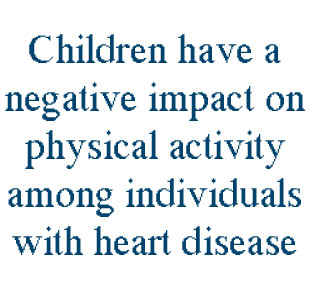
The study initiated on 756 participants, aimed to ascertain the consequences of social networks on exercise. It was then concluded that heart disease patients dwelling with children exercise less as compared to people not living with children. Most heart patients have knowledge of the benefits an exercise regimen, yet they fail to follow. Therefore, the scientists wanted to evaluate the precise reason behind this inability of the patients to exercise daily.
Dr. Simon L. Bacon, Associate Researcher at the MHI and Professor at Concordia University and the director of the study explained, “This study has led us to reconsider the way we go about motivating our patients to change their lifestyle habits. Perhaps our efforts should target the patient’s entire family. It would be interesting to explore this approach in a subsequent study.â€
On completion of the study, the experts suggest that living with someone like a spouse may not hamper participation in physical activities. But residing with children may display detrimental influence on a parent’s capability to exercise.
Dr. Martin Juneau, the director of prevention at the MHI remarked, “Since parents serve as models for their children, it’s essential that we urge them to be more active so that their family members will do the same. Some of our patients change their lifestyle habits and choose to put health at the centre of their lives. The cardiac rehabilitation program at the MHI’s Centre for Preventive Medicine and Physical Activity — also called the ÉPIC Centre — was designed specifically to help patients integrate exercise into their daily lives.â€
Further, the study authors also suggest guidelines to be taken for motivating people with a coronary disease. These steps can probably enhance such patients to stay away from a sedentary lifestyle which is a crucial factor for future major cardiovascular events.
The study was conducted in collaboration between researchers at the MHI (all affiliated with the Université de Montréal), Hôpital Sacré Cœur de Montréal and Concordia University.
